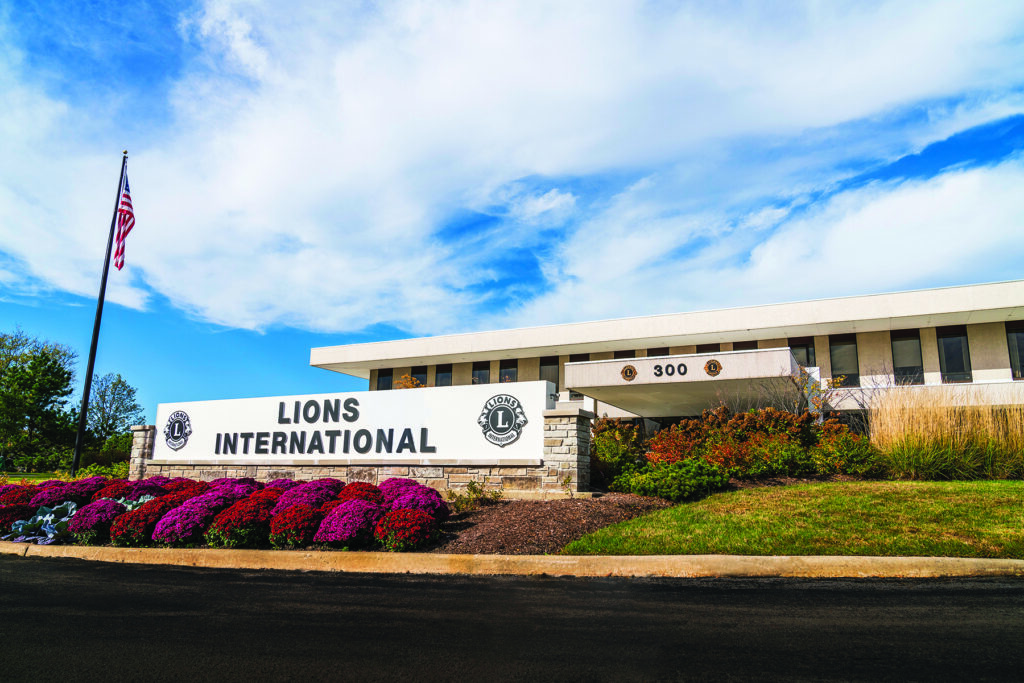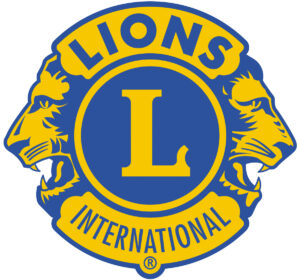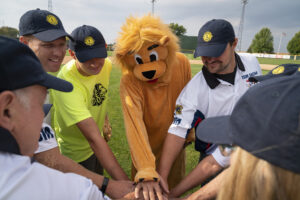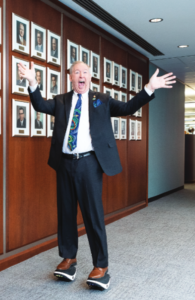Lions Roar in the Oak Brook Area

How Lions Club Headquarters serves volunteers worldwide
By Larry Atseff
Did you know that the headquarters of the largest volunteer service organization in the world is located right in Oak Brook? We are referring to Lions International which was started in 1917. A sidebar lists just a few key milestones, including locating in Oak Brook in 1971. You are about to learn how just 300 employees, in a small, unassuming two-story building at the corner of 22nd Street and York Road in Oak Brook, provide unparalleled support, guidance, and encouragement to an astonishing 1.4 million volunteers in nearly 50,000 clubs around the world. Read that again. Even more important, you are also going to learn how you can become involved locally with this extraordinary group as a local Lion volunteer and/or as a donor to local causes as they push forward into 2023, in our area, with a renewed effort. Why Have Lions Clubs Succeeded So Well, For More Than A Century? For an answer to that key question, we spoke to Sanjeev (s-uh-n-j-ee-v) Ahuja, Executive Administrator of Lions International, who has a great vantage point of the entire enterprise. As he put it, “First and foremost is the positive mindset of Lions, from top to bottom. Lions have a desire/ passion for helping people deal with local and global issues.
 They provide physical hands-on local support and raise money to help overcome local humanitarian problems. They also provide support for global initiatives like vision, childhood cancer, diabetes, hunger, and the environment. They enjoy the fellowship of membership, and they do it all with a smile.” “Second, the founder of the Lions Clubs International, Melvin Jones, had the vision to fashion LCI’s governance by leaning on key volunteer leadership, on a geographic basis, with minimal layers. Leaders would be called Governors of territories. That helped greatly as the organization grew efficiently around the world. These unpaid 2,500 volunteer leaders are well-trained, experienced facilitators between the HQ and the local clubs. “Third, in turn, HQ and the facilitators support and encourage the local Clubs. The Clubs are made up of volunteer leaders and volunteer members. Clubs are autonomous. Members are the ‘doers’, whether it is contributing time and talent to a money-raising event like running a pancake breakfast, collecting money at street corners in return for candy, helping with a hands-on effort at a local disaster, helping to plant trees, collecting eyeglasses for recycled use… whatever the need, local or global.” “Fourth, over the years, headquarters has collected an unmatched wealth of knowledge about how Clubs all over the world have run successful programs. That data is available to clubs as they work within their communities.” “Fifth, then there is the Lions Clubs International Foundation, which provides grant funding to support the compassionate works of Lions, empowering their service and addressing the needs of their communities both locally and globally.”
They provide physical hands-on local support and raise money to help overcome local humanitarian problems. They also provide support for global initiatives like vision, childhood cancer, diabetes, hunger, and the environment. They enjoy the fellowship of membership, and they do it all with a smile.” “Second, the founder of the Lions Clubs International, Melvin Jones, had the vision to fashion LCI’s governance by leaning on key volunteer leadership, on a geographic basis, with minimal layers. Leaders would be called Governors of territories. That helped greatly as the organization grew efficiently around the world. These unpaid 2,500 volunteer leaders are well-trained, experienced facilitators between the HQ and the local clubs. “Third, in turn, HQ and the facilitators support and encourage the local Clubs. The Clubs are made up of volunteer leaders and volunteer members. Clubs are autonomous. Members are the ‘doers’, whether it is contributing time and talent to a money-raising event like running a pancake breakfast, collecting money at street corners in return for candy, helping with a hands-on effort at a local disaster, helping to plant trees, collecting eyeglasses for recycled use… whatever the need, local or global.” “Fourth, over the years, headquarters has collected an unmatched wealth of knowledge about how Clubs all over the world have run successful programs. That data is available to clubs as they work within their communities.” “Fifth, then there is the Lions Clubs International Foundation, which provides grant funding to support the compassionate works of Lions, empowering their service and addressing the needs of their communities both locally and globally.”
“Together, We Can” Is the vision of International Lions President Brian Sheehan
Brian, like every International President, is elected to serve a oneyear term, by fellow Lion leaders, starting every June. It is the ultimate honor and recognition for outstanding service over a long span of time. Each comes into the office with their own agenda. In Brian’s case, he has chosen to emphasize the genuine joy and positivity that comes when Lions work together. His watchwords: Together, We Can. And Together, We Will, complete with a great deal of energy and enthusiasm. Brian grew up in a Lion family in the small town of Bird Island, Minnesota. His father was a founding member of the local Lions Club in 1964. “We’re part of a fourth-generation Lions family. Service was simply a part of my childhood, from delivering Meals on Wheels to selling Christmas trees and then collecting them for the local Lions club bonfire. At 6 years of age, and in a small community, and with all the things we wanted to be done, we just tagged along.” As he grew up, he became more involved, cooking homemade sausage for local events and taking part in the local demolition derby. Eventually, he joined. He knew that Lions were there making his community- and communities around the world, even stronger. Even better. Even closer. “I saw this team approach in our club. It was always community first.”
As he became more involved locally, he also started to become more involved with the organization on a larger scale beyond Bird Island. Eventually, he found himself contributing his ideas and his enthusiasm for teamwork at Headquarters, as the organization undertook a revitalization of the Lions Clubs in the United States, including adding more clubs. Working with Sanjeev at Headquarters, and others, they developed the Global Membership Approach that emphasized that Lions Clubs can contribute more when there are more hands involved. This includes a plan that called for properly identifying community problems using SWOT analysis, (S=Strengths, W=Weaknesses, O=Opportunities, and T=Threats.) at District and Zone levels. This led to testing for the best ways to build teams, establish a longterm vision for each club, create plans, and develop more and better recognition of efforts. This program has been successful in growing Lions Clubs in the US.

Lions Club volunteers give their time as well as physical effort
As Brian sees it, these are the priorities for Lions Clubs today.
“First, share the joy of being a Lion. When our clubs grow, so does the kindness we bring. It takes healthy clubs to keep our service going, our members happy and our communities strong. When we invite family, friends, and neighbors to join us, we increase what we can do together. And the fun we can have together.” “Second, keep our Foundation strong. Our service is powered by our Lions Club International Foundation, LCIF. Together, we take on bigger projects that lead to bigger impacts and bigger changes, where we live and around the world. Last year alone, LCIF awarded more than $35 million dollars in grant funding across the globe.” “Third, think big when we serve. Let’s think about how we can make the projects we love even better, and let’s look for new ways to support our global causes because real change starts with big ideas. Don’t shy away from taking on a big, daring project, and be prepared to be amazed at what we can do together.” “Fourth, be a local advocate. Lions are leaders in their communities, and our service and our voices matter. So be a champion for a local cause. Create awareness, education and change. Become a local leader- and a vocal leader-for your club, your causes and your community.”
“First and foremost is the positive mindset of Lions, from top to bottom. Lions have a desire/passion for helping people deal with local and global issues.”
Bringing “Together, We Can”, to the Oak Brook area
We talked with Lion Jim Kiser, the District Governor for local Lions Clubs in and around Oak Brook about Sheehan’s “Together, We Can” approach. Currently, there are the following Lions Clubs in the area: Oak Brook/Hinsdale/ Burr Ridge (30-35 members), Darien (140 members), Westmont (35), Downers Grove (10), Oak Brook Terrace (15), Villa Park (10- 15) and Clarendon Hills (45). Included in these groups are many Lions employees from the Oak Brook Lions Headquarters. They not only talk the talk, but they also walk the walk. Like elsewhere, the need for help in the past 3 years has grown, due to the pandemic, and now inflation that affects everyone, including those in affluent communities in which we live. According to Jim, “Over the years, it turns out that the most effective way to help people in need is to give them money. The food banks are helpful, but often what is being made available may not always be what most people really need. This is sometimes caused when people donate “stuff” they no longer want… and that becomes the stuff the needy don’t need.”

Brian Sheehan leads Lions Club International volunteers worldwide
“Instead of food, families might be more in need of toilet paper or personal items. In some cases, some outlets, like churches, become known for what they offer. In the final analysis, money becomes the most efficient, effective way to help people.” “Therefore, the Lions put focus on fundraising to raise money. The traditional Candy Sale at intersections is a proven, perfect example. There are other interesting ways to raise money, like providing an American Flag with a pole and solar lighting that Lion members install on lawns so the flags can be waved every day. This kit is a very popular, patriotic way for Lions to raise money and promote patriotism at the same time.” “Other perennial favorites used locally are the Pancake Breakfasts, and Raffle Tickets, which, incidentally, clear 50% of the money raised for each raffle, after winners are paid.” One of the most effective ways that local clubs work is to support the HCS Food Pantry in Hinsdale. This non-profit has seen the number of cars lining up on Fridays to receive food baskets grow exponentially. Jim would like to expand the impact of Lions Clubs in the greater Oak Brook area. It is, after all, the home of the International Headquarters. If Brian Sheehan’s call for action resonates with you, get involved by contacting Jim Kiser at 630 660 7944. For more information about how you can support Lions International, visit lionsclubs.org
——————————————————
A Lot to Roar About: Notable Lions Milestones
1917- The Lions Club was formed in 1917, led by visionary Melvin Jones. He told members of a Chicago business club they should reach beyond business issues and address the betterment of their communities and the world. After contacting similar-minded groups around the United States, an organizational meeting was held in June 1917 in Chicago. The new group took on the name “Association of Lions Clubs,” after one of the attending organizations. A national convention was held in October in Dallas, complete with a constitution, by-laws, objectives, and a code of ethics. Chicago would be the Headquarters.
1920- Lions Clubs became international with the Lions Club charter in Windsor Ontario, Canada.
1925- Helen Keller appealed to Lions to become “Knights of the blind in the crusade against darkness.” This led to ongoing global support to fight blindness and improve vision. Today, Lions recycle eyeglasses worldwide and are at the forefront of research to create artificial vision systems.
1939- A Lion in Williamsport, Pennsylvania, appealed to local Lions Clubs and other partners to form the first organized sports program for children. They called it Little League.
1945- Because Lions Clubs were so influential worldwide, the Lions were called on to help form the United Nations charter.
1954- After an international contest, the official motto, “We Serve,” was adopted.
1957- A youth program called Leo Clubs was created.
1968- Lions Clubs International Foundation was created to grant money to significant causes worldwide. Since then, over 1.2 billion in grants have supported large humanitarian efforts such as disaster relief and youth programs in addition to 5 global causes: Childhood Cancer, Vision, Diabetes, Hunger, and the Environment.
1971- Lions Clubs International moved to Oak Brook.
1973- Lions Clubs International exceeds one-million members.
1986- Mother Teresa received the Lions Humanitarian Award.
1990- SightFirst was created, raising more than $415 million to help eradicate major causes of blindness.
2007- “Financial Times” rates Lions Clubs International Foundation as the best non-governmental organization to partner with.
2017- Lions celebrate a century of service by serving more than 250 million people worldwide through a special Centennial Service Challenge.
*Photos provided by Lions Club International
